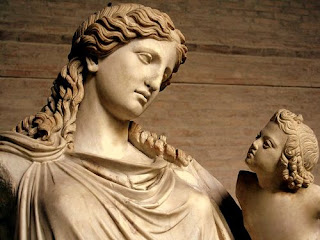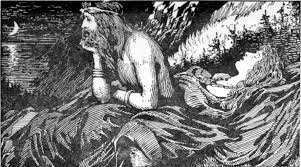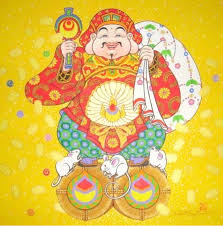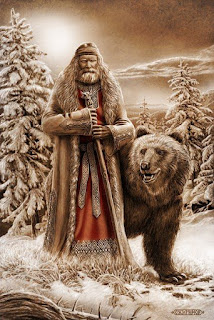It is believed that the god Kubera, the treasurer of the gods, is the richest deity. Lakshmi Tantram says that even Kubera will pray to goddess Lakshmi, the goddess of wealth and consort of Vishnu, on Akshay Tritiya. A day-long Kubera Lakshmi Puja is performed in which an image of Lakshmi is worshiped with Sudarsana Kubera Yantra, symbolizing Kubera. Kubera is not alone as the richest god there are many gods from cultures around the world who govern the riches.
Ploutos -The Rich Greek God
 Ploutos was the Greek god of wealth. In agrarian Greece, he was at first associated purely with a bounty of rich harvests. Later he came to represent wealth in more general terms. Ploutos was a son of Demeter, the goddess of agriculture, who bore him after lying with the hero Iasion in a thrice-plowed field. He was blinded by Zeus so he would distribute wealth indiscriminately and without favor towards the good or the virtuous. The god was usually depicted as a boy holding a cornucopia filled with grain in the company of his mother Demeter. In sculpture, he was often shown as an infant in the arms of either Eirene, the goddess of peace, or Tykhe, the goddess of fortune. Ploutos was identified with Plouton, the god Haides in his role as the deity of the earth’s hidden stores of wealth who was also depicted with a cornucopia in this guise.
Ploutos was the Greek god of wealth. In agrarian Greece, he was at first associated purely with a bounty of rich harvests. Later he came to represent wealth in more general terms. Ploutos was a son of Demeter, the goddess of agriculture, who bore him after lying with the hero Iasion in a thrice-plowed field. He was blinded by Zeus so he would distribute wealth indiscriminately and without favor towards the good or the virtuous. The god was usually depicted as a boy holding a cornucopia filled with grain in the company of his mother Demeter. In sculpture, he was often shown as an infant in the arms of either Eirene, the goddess of peace, or Tykhe, the goddess of fortune. Ploutos was identified with Plouton, the god Haides in his role as the deity of the earth’s hidden stores of wealth who was also depicted with a cornucopia in this guise.
Njörð- The wealthy Nordic god
In Norse mythology, Njörðr is a god among the Vanir. Njörðr, the father of the deities Freyr and Freyja by his unnamed Vanir sister, was in an ill-fated marriage with the goddess Skaði, lives in Nóatún, and is associated with the sea, seafaring, wind, fishing, wealth, and crop fertility. In the Prose Edda, Njörðr is introduced in chapter 23 of the book Gylfaginning. In this chapter, Njörðr is described by the enthroned figure of High as living in the heavens at Nóatún, but also as ruling over the movement of the winds. Having the ability to calm both sea and fire, he is to be invoked in seafaring and fishing. High continues that Njörðr is very wealthy and prosperous. He can also grant wealth in land and valuables to those who request his aid.
unnamed Vanir sister, was in an ill-fated marriage with the goddess Skaði, lives in Nóatún, and is associated with the sea, seafaring, wind, fishing, wealth, and crop fertility. In the Prose Edda, Njörðr is introduced in chapter 23 of the book Gylfaginning. In this chapter, Njörðr is described by the enthroned figure of High as living in the heavens at Nóatún, but also as ruling over the movement of the winds. Having the ability to calm both sea and fire, he is to be invoked in seafaring and fishing. High continues that Njörðr is very wealthy and prosperous. He can also grant wealth in land and valuables to those who request his aid.
Daikokuten- The Wealthy Japanese God
In Japan, Daikokuten, the god of great darkness or blackness, or the god of five kinds of cereal, is one of the Seven Lucky Gods. The god enjoys an exalted position as a household deity in Japan. Daikoku’s association with wealth and prosperity precipitated a custom known as fukunusubi, or “theft of fortune”. This custom started with the belief that whoever stole divine figures was assured of good fortune, if not caught in the act. In the course of time, stealing divine images became so common a practice in Japan. The Toshi-no-Ichi “year-end market” held at Sensō-ji became the main venue for the sale and disposal of such images by fortune-seekers. Many small stalls were opened where articles including images of Daikoku were sold on the eve of New Year celebrations. He is recognized by his wide face, smile, and flat black hat. Daikoku is often portrayed holding a golden mallet called an Uchide no kozuchi, otherwise known as a magic money mallet. He is seen seated on bales of rice, with mice nearby signifying plentiful food.
Yacatecuhtli- Aztec god of Business
Yacatecuhtli was the patron Aztec god of commerce and travelers, especially business travelers. His symbol is a bundle of sticks. Merchants would carry a Uttal cane as they moved from village to village peddling their wares. At night time would tie them together into a neat bundle before sprinkling them with blood from their ears. It was believed that this ritual in Yacatecuhtli’s honor would guarantee success in future business ventures. He would also grant protection from vicious beasts and robbers on their journeys.
Veles- Slavic god of cattle and money
Slavic god of cattle and horned livestock (skotnyi bog). Veles also became associated with commerce, wealth, and prosperity; merchants often sealed their agreements by swearing upon his name, and legal documents sometimes concluded with oaths to him.
The Slavic god of cattle and horned livestock (skotyi bog). Veles also became associated with commerce, wealth, and prosperity; merchants often sealed their agreements by swearing upon his name, and legal documents sometimes concluded with oaths to him. Some Baltic groups worshipped Veles as well, but connected him more with the underworld and the dead; the Lithuanian root vele means “shade of the deceased” or “shadow of death.”


